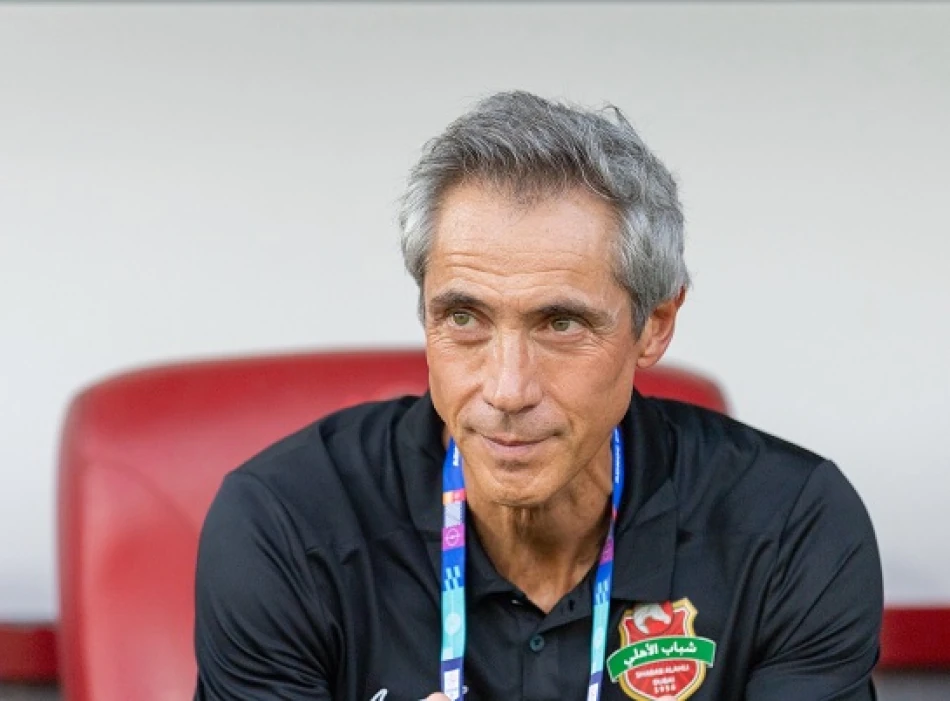
Al Ahly U23 Coach Sosa Praises Emirati Refereeing, Acknowledges Game's Inherent Errors
Paulo Sousa Backs UAE Refereeing Standards as Al Ahli Youth Eyes Regional Dominance
Portuguese coach Paulo Sousa has praised the UAE's football officiating system as "excellent" while positioning his Al Ahli Youth squad for what he expects to be the most competitive season yet in the ADNOC Pro League. Speaking ahead of Saturday's high-profile clash with Al Wahda, Sousa highlighted the league's growing strength and his team's ambitions to compete at the highest Asian level despite increased spending by Gulf rivals.
UAE League Quality Reaches New Heights
Sousa's assessment of UAE football reflects a broader trend across the Gulf region, where domestic leagues have invested heavily in infrastructure and talent development. His prediction that four to five teams will genuinely compete for domestic honors this season suggests the league has achieved the competitive balance that has eluded many regional competitions.
"The current season will witness competition between four or five teams for local championships, and what appeared in the first round was clear evidence of that," Sousa told local media. This competitive depth mirrors developments in other emerging football markets, where initial dominance by one or two clubs eventually gives way to more balanced competition.
Refereeing Standards Signal Professional Maturity
Sousa's praise for UAE officiating represents more than diplomatic courtesy. Consistent, high-quality refereeing often serves as a bellwether for league development, attracting better players and increasing broadcast value. His acknowledgment that "errors are part of the game everywhere in the world" while praising overall standards suggests the UAE has reached a professional threshold that many developing leagues struggle to achieve.
Star Power vs. Team Chemistry: The Azmoun Factor
The coach's measured approach to Iranian striker Sardar Azmoun's return from injury reveals sophisticated squad management. Rather than rushing back one of the Gulf's premier forwards, Sousa emphasized systematic preparation and team cohesion.
"Sardar may not be in the team lineup at the end of this month or the beginning of next month, but he will join directly once he reaches full readiness," Sousa explained. This patient approach contrasts sharply with the immediate-impact expectations often placed on marquee signings across the region.
Building Beyond Individual Talent
Sousa's emphasis on collective strength over individual brilliance positions Al Ahli Youth strategically against wealthier competitors. While Saudi and Qatari clubs have made headlines with high-profile international signings, the Portuguese coach is betting on tactical discipline and team unity.
"Football is a team game, and the team that started with me last season is capable of proving itself strongly," he stated, directly addressing the challenge posed by regional rivals' spending power.
Asian Champions League Ambitions
Al Ahli Youth's continental aspirations reflect the UAE's broader football strategy. The club's determination to compete in the AFC Champions League despite resource disparities with Saudi and Qatari competitors mirrors the UAE's approach across multiple sectors – leveraging efficiency and strategic planning to compete with larger neighbors.
This approach has precedent in regional football. Clubs like Qatar's Al Sadd and UAE's Al Ain have historically punched above their financial weight in Asian competition through superior organization and tactical preparation.
Market Implications for Gulf Football
The competitive balance Sousa describes could significantly impact broadcast rights values and sponsorship deals for the UAE league. Investors and media companies typically prefer competitive uncertainty over predictable dominance, suggesting the league's commercial potential may be reaching an inflection point.
Starting the season with a 2-0 victory over Al Dhafra, Al Ahli Youth has positioned itself as a serious contender in what promises to be the most competitive UAE season in recent memory. Sousa's confidence in his squad's ability to compete without matching rivals' spending suggests a sustainable model that could influence football development across the region.
Most Viewed News

 Sara Khaled
Sara Khaled






